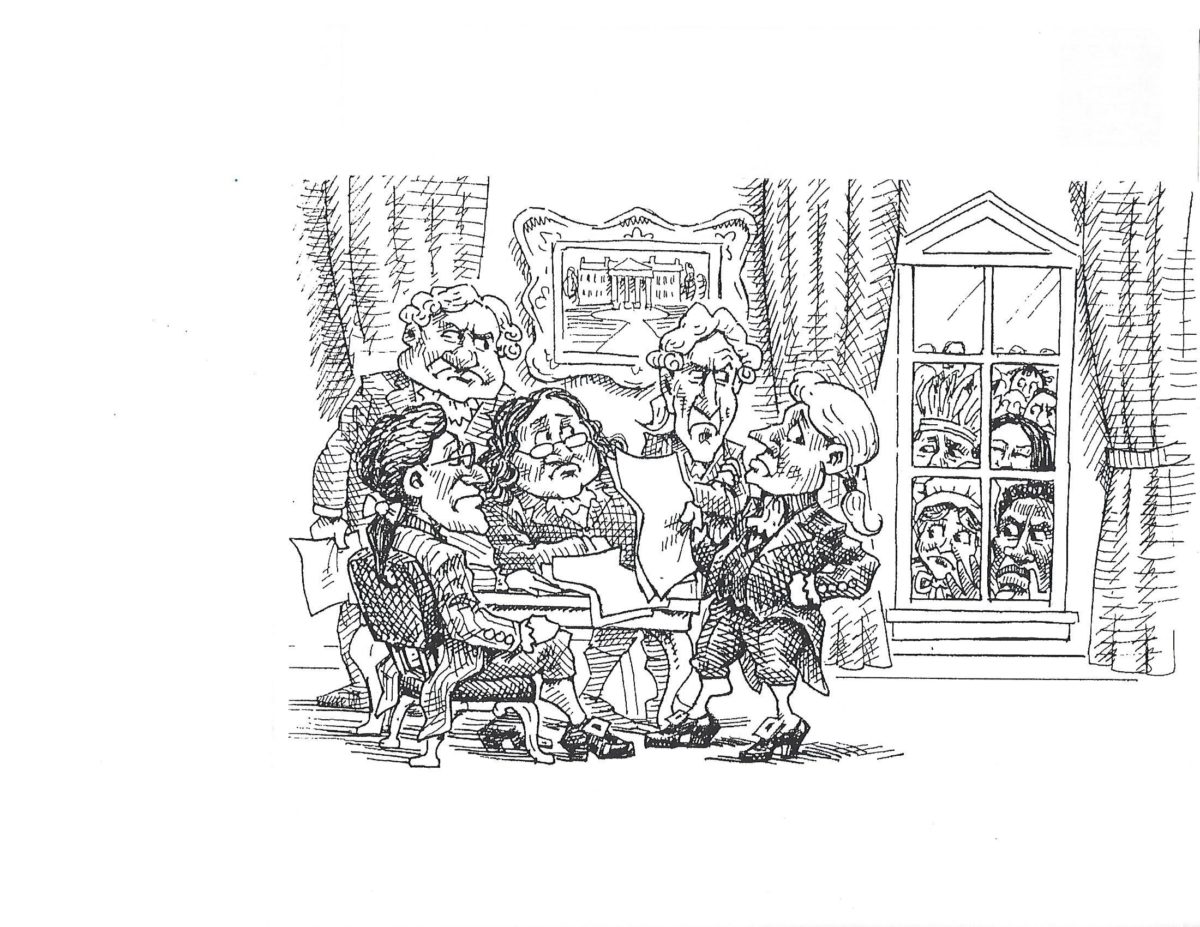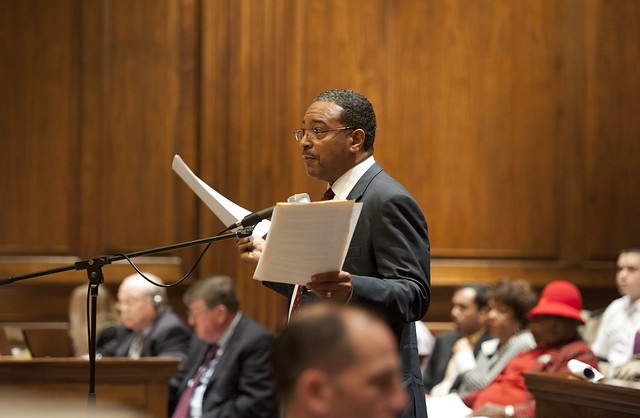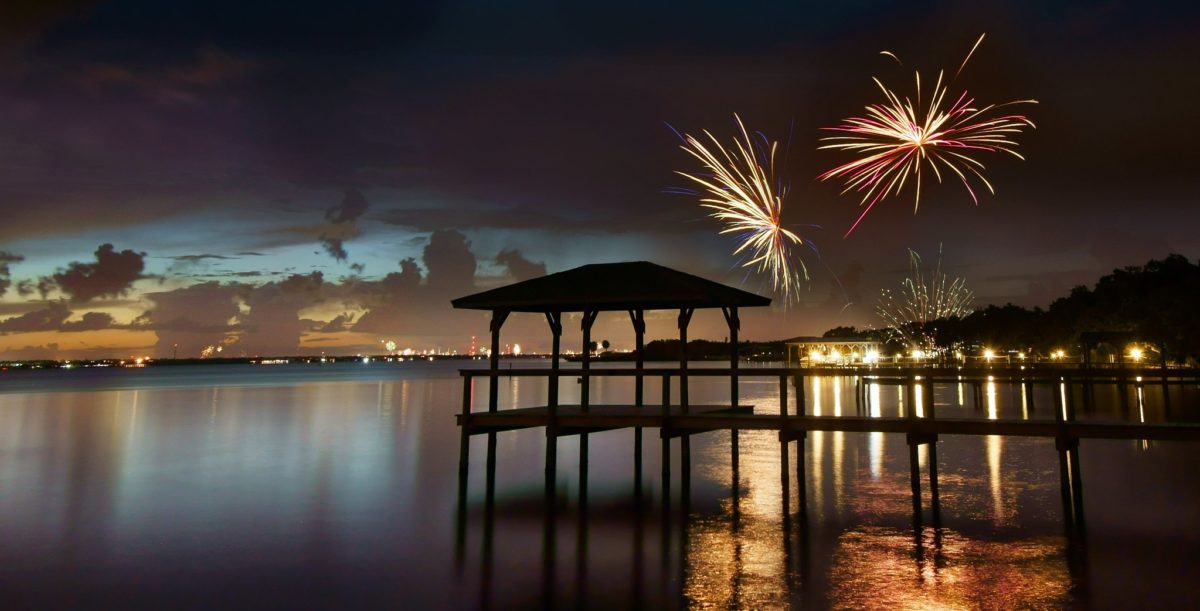Revolution and Counterrevolution: The People vs. the Federalists
Fourth of July celebrations commemorate the signing of the Declaration of Independence, not the U.S. Constitution of 1789. We should be thankful for that. The wealthy Federalists who overturned the first Constitution – the Articles of Confederation – replaced it with the rules that govern us to this day.
The Articles of Confederation and the political society it was created to protect had many grave flaws. But the Federalists did not aim to remedy forms of racial, gender and economic oppression perpetuated in the Articles. Instead, their priorities were in re-asserting and institutionalizing an elite status quo that was momentarily threatened by the Revolution’s upheaval. The new U.S. Constitution created a privatized government of sorts, which constitutionalized legislation that perpetuated legal advantages for the wealthy white elite, including through the Commerce Clause, the Fugitive Labor Clause, the Three-Fifths Clause, the Contract Clause, and others.

The Closed-Door Constitutional Convention by Matt Wuerker
The Federalists’ new constitution was drafted in secret. In it, the Federalists took the right of self-government away from communities and centralized power in a government far-removed from the people. Instead of the egalitarian, non-hierarchical direct democracy Thomas Paine and his militant revolutionaries advocated for, the Federalists proposed a government that would quietly replace the King with a wealthy home-grown American aristocracy.
Democratic Ideals
The Declaration of Independence wasn’t the original work of Thomas Jefferson. He borrowed such phrases as “consent of the governed,” and ideas like “the people are the source of governing authority,” from peasants who demanded control over the British House of Commons. A century later, these were ideas that resonated with colonists in North America.
When Jefferson (a slave owner) listed the colonist’s grievances against the Crown in the second half of the Declaration, he borrowed language from resolutions sent to the Continental Congress by more than ninety towns and counties throughout the colonies. The very first one mentioned is the preemption of local laws by the central government:
“HE [the king] has refused his Assent to Laws, the most wholesome and necessary for the public Good.”
Today, across the country, a usurpation of local laws is happening in town after town. States and the federal government are preempting local laws intended to protect workers, immigrants, and the homeless, and to fend off resource extraction, toxin dumping, and property confiscation. What American revolutionaries listed as the first order of business for the revolution is now the chief counterrevolutionary project of such organizations as the American Legislative Exchange Council, the National Restaurant Association and anti-immigrant bigots (most recently in Florida).
American revolutionaries listed other grievances unrelated to the right to self-govern in their communities. They sought freedom to pillage and colonize, and to establish a continental empire without the crown’s interference. Though a flawed legacy, we can draw from American revolutionaries’ pro-democracy sentiments.
American Revolutionaries Opposed Preemption
In the absence of local lawmaking authority, local decisions had to gain approval of appointed colonial governors. The Declaration complained of this as-yet unresolved condescension. Today, in many states, local laws have no effect until they are approved by officers of the state.
Since independence, Americans have won universal suffrage and civil rights expansions. Yet today, we find ourselves in a similar situation, where we can vote, but our votes seem to matter less and less. Our local governments have been subordinated to out-of-reach state legislatures.
Americans today, most of whom were excluded from the colonial project, have a lot in common with the colonists who found their lives and freedoms curtailed by bureaucratic shell games. The next grievance Jefferson listed against the empire read,
“HE has called together Legislative Bodies at Places unusual, uncomfortable, and distant from the Depository of their public Records, for the sole Purpose of fatiguing them into Compliance with his Measures.”

Public Hearing on the Legislative Redistricting Plan by Maryland GovPics in Flickr Creative Commons
What activist hasn’t had to skip a day of work and travel to a hearing halfway across the state to testify before legislators, bureaucrats, and regulators? It’s a situation that would be rare if the people’s representatives remained in the communities they supposedly serve, to learn the will of their constituents. Instead, they gather in ostentatious capitols where lobbyists and paid persuaders have their ear every day.
Like municipal residents across America today, the revolutionaries were outraged when the empire legalized the violation of people’s rights. And when colonists challenged that oppression with local laws to protect their safety, the empire nullified, vetoed, and preempted them, rendering local officials and local laws irrelevant. Jefferson framed their complaint this way:
“HE has dissolved Representative Houses repeatedly, for opposing with manly Firmness his Invasions on the Rights of the People.
Not all Historians Avoid Admitting the Counterrevolution – Nor Should We
American courts today don’t consider the Declaration of Independence a precedent-setting document. That makes sense only when we realize that the Federalist counterrevolution opposed its democratizing doctrines. Robert L. Brunhouse wrote a detailed account of how unpropertied commoners took control of the Pennsylvania colonial assembly in 1776 and precipitated a vote in the Continental Congress to adopt the Declaration. Without their insurrection against property qualifications for voting and holding office, New York and other states would not have agreed to the Declaration, and the colonies would not have seceded from the British Empire.
Brunhouse’s book documents how, following adoption of an ultrademocratic state constitution in Pennsylvania and the Revolution’s success, the Federalists’ counterrevolution unraveled those democratic gains with their conspiratorial drafting and rush to ratify a Federalist, partisan, undemocratic constitution.
American courts today don’t consider the Declaration of Independence a precedent-setting document. That makes sense only when we realize that the Federalist counterrevolution opposed its democratizing doctrines.
Within a year they had also nullified Pennsylvanians’ democratic trend-setting state constitution, which did away with property qualifications for voting and holding office for adult males, white and black. It established a unicameral legislature of representatives directly elected by communities, not politically gerrymandered districts. That legislature was not subject to reversal by an aristocratic Senate or a monarchical Supreme Court. Rather, a Council of Censors made up of seven men directly elected by the counties had power to challenge legislation by questioning its harmony with the state constitution. They also had power to recommend amendments to the constitution.
Instead of allowing this more democratic constitution to stand, wealthy Pennsylvanians ignored the Council of Censors and overturned it, erecting a new state government that mimicked the Federalists’ federal constitution.
So, let’s celebrate the Revolution and the Declaration. But let this holiday remind us that the Revolution was put on hold, its aspirations set-aside to advantage the wealthiest in society. The bitter results of abandoning the better ideals of the Revolution are all around us in plain sight.
It is time to restart the American Revolution and to settle our grievances with power and privilege once and for all.
Ben G. Price is National Organizing Director for CELDF and author of the newly released book, How Wealth Rules the World: Saving Our Communities and Freedoms from the Dictatorship of Property. This essay is adapted from an excerpt from Chapter 5 of that book.
Featured image: Fireworks along the Indian River Lagoon by Jill Bazeley, Flickr Creative Commons.

